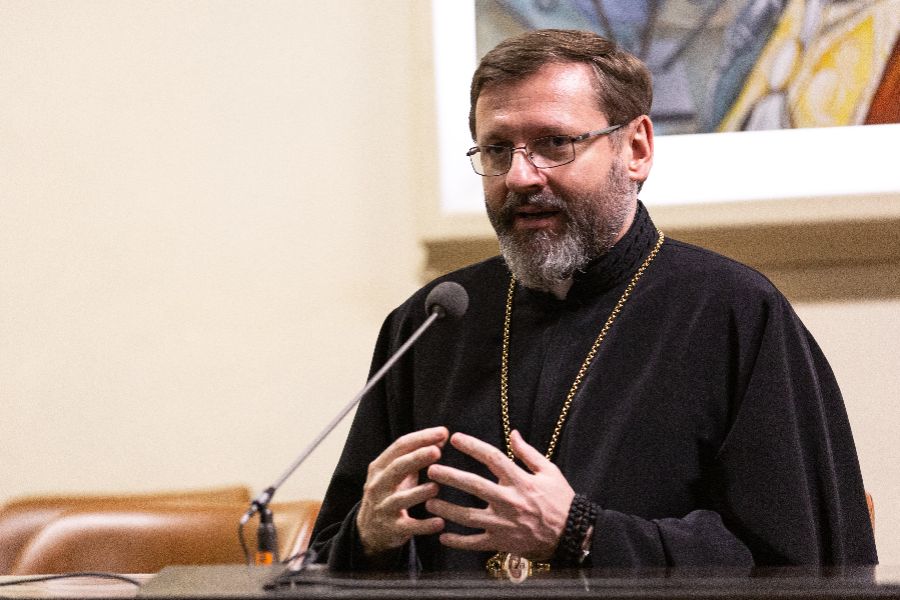Major Archbishop Urges Ukrainians to be United in Face of ‘Great Threat’
Archbishop Shevchuk, who has led the largest of the 23 Eastern Catholic Churches in full communion with Rome since 2011, said in his message to Ukrainians that the contemplation of the unity of the Holy Trinity in the life of the Church could deepen their reflections on unity.

The leader of the Ukrainian Greek Catholic Church has urged people in Ukraine to remain united in “the face of this great threat … on our borders.”
Major Archbishop Sviatoslav Shevchuk said that internal unity within Ukraine was essential “for the security and survival of our people” as the Eastern European country faces a potential full-scale Russian invasion.
The archbishop’s appeal for unity came ahead of President Volodymyr Zelenskiy’s declaration that Feb. 16 will be a “day of unity” in Ukraine.
“They tell us Feb. 16 will be the day of the attack. We will make it a day of unity,” Zelenskiy commented in a video message on Feb. 14, according to Reuters, which said that the Ukrainian president was not predicting an attack, but responding to foreign media reports.
“On that day, we will hang our national flags, wear yellow and blue banners, and show the whole world our unity,” Zelenskiy said.
Cardinal Pietro Parolin, the Vatican Secretary of State, called Archbishop Shevchuk on Feb. 14 to express the Holy See’s solidarity with the Ukrainian people, according to a statement from the Ukrainian Greek Catholic Church on Feb. 15.
“Ukrainian people feel the Holy Father’s special concern for peace in Ukraine and appreciate the diplomatic efforts of the Holy See to combat the current international crisis,” Archbishop Shevchuk said in response to the call.
Archbishop Shevchuk, who has led the largest of the 23 Eastern Catholic Churches in full communion with Rome since 2011, said in his message to Ukrainians that the contemplation of the unity of the Holy Trinity in the life of the Church could deepen their reflections on unity.
The Latin Catholic bishops’ conference of Ukraine has called for Feb. 16 to be a “day of intense prayer and fasting.”
“At this difficult time, as we face growing tensions over the threat of a full-scale military invasion of Ukraine, we call on all of you to continue to pray fervently, raising your eyes with confidence to God, the Lord of the world and history,” the Ukrainian bishops said in a Feb. 15 statement.
In particular, the Catholic bishops have asked for people to pray the Divine Mercy Chaplet at 3 p.m. local time with the intention of “asking God to remove the threat of war, for security for our families and the gift of peace for Ukraine and the world.”
“Let us pray to God with the words of the supplication: ‘Holy God, Holy Mighty One, Holy Immortal One, have mercy on us. From the sea, famine, fire, and war, save us, Lord,’” they said.
In neighboring Belarus, which shares an almost 700-mile border with Ukraine, Bishop Aleh Butkevich, the head of the Belarusian Catholic bishops’ conference, also called on Catholics to show solidarity through prayer and fasting for peace on Feb. 16.
Ecumenical Patriarch Bartholomew I of Constantinople, regarded as the “first among equals” in the Eastern Orthodox Church, called for peace in Ukraine in a statement on Feb. 13.
“The possibility of a new war in Europe, resulting from the escalation of violent rhetoric and militarization of the borders between Russia and Ukraine, should be unequivocally opposed. We call for enduring peace, stability, and justice in the region,” the Orthodox patriarch said.
“We call upon all parties involved to pursue this path of dialogue and respect for international law, in order to bring an end to the conflict and allow all Ukrainians to live in harmony. Arms are not the solution,” he said.
“Silence and indifference are not an option,” he added. “There is no peace without constant vigilance.”













